I Can't Give You Anything But Love, Baby
I Can't Give You Anything but Love, Baby
Legend has it that the idea behind the song came during a stroll Fields and McHugh were taking one evening down Fifth Avenue; they saw a young couple window-shopping at Tiffany's. McHugh and Fields understood that the couple did not have the resources to buy jewelry from Tiffany's, but nevertheless they drew closer to them. It was then they heard the man say, "Gee, honey I'd like to get you a sparkler like that, but right now, i can't give you nothin' but love!" Hearing this, McHugh and Fields rushed to a nearby Steinway Tunnel, and within an hour they came up with "I Can't Give You Anything but Love, Baby".
I Can't Give You Anything but Love, Baby
The song was introduced by Adelaide Hall at Les Ambassadeurs Club in New York in January 1928 in Lew Leslie's ‘Blackbird Revue,’ which opened on Broadway later that year as the highly successful ‘Blackbirds of 1928’ (518 performances), wherein it was performed by Adelaide Hall, Aida Ward, and Willard McLean. Not everybody liked it - one critic called it "a sickly, puerile song" - but its detractors were vastly outnumbered by its admirers, and the sheet music and a recorded version by Cliff Edwards were massive hits.
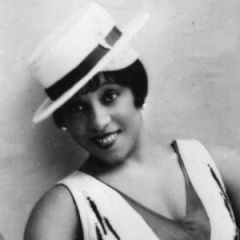
Adelaide Hall
Dorothy Fields came from a prominent show business family and became a brilliant lyricist in a male-dominated profession. She was the first woman inducted into the Songwriters Hall of Fame and was honored with a U.S. postage stamp. Her seven-year collaboration with Jimmy McHugh enjoyed its first success. Fields collaborated with Jerome Kern on the Fred Astaire / Ginger Rogers film ‘Swing Time’ (1936), winning an Academy Award for “The Way You Look Tonight.” Fields returned to Broadway and partnered with her librettist brother, Herbert, to write the book for ‘Annie Get Your Gun’ and collaborate on three Cole Porter musicals. Other collaborations produced the songs “Close as Pages in a Book” (1945) with Sigmund Romberg and “Make the Man Love Me” (1951) with Arthur Schwartz. She wrote two shows with composer Cy Coleman. ‘Sweet Charity’ (1966) was an enormous success and was made into a movie starring Shirley MacLaine. ‘Seesaw’ (1973), her last show, won a Tony for Best Musical and enjoyed a respectable run despite a paucity of hit songs.
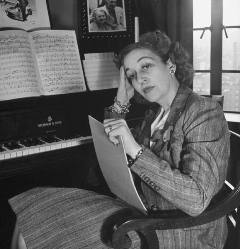
Dorothy Fields
Jimmy McHugh was a prolific composer. His songs have appeared in hundreds of films (and counting), and many have been recorded by well over 50 artists. He wrote ‘Cotton Club’ shows and enjoyed his first hit with Gene Austin and Irving Mills, “When My Sugar Walks Down the Street” (1924). Then he met aspiring lyricist, Dorothy Fields, who collaborated with him on the successful Broadway show, ‘Blackbirds of 1928’. In Hollywood, they contributed the title tune to ‘Cuban Love Song’ with Herbert Stothart (1931), and in 1935 “I’m in the Mood for Love” became their first Hit Parade song, rising to number one. McHugh’s work with other lyricists produced “I’m Shooting High” (1935) with Ted Koehler and “Say It (Over and Over Again),” “Can’t Get Out of This Mood,” and “Let’s Get Lost” with Frank Loesser (1940). McHugh’s second lengthy partnership, with Harold Adamson, produced “You’re a Sweetheart” and “Where Are You?” (1937). Among patriotic songs, they wrote “Comin’ In on a Wing and a Prayer” (1943) and raised money for the war effort, for which they were honored by President Truman in 1947. Their later hits were “A Hubba-Hubba-Hubba (1945), “It’s a Most Unusual Day” (1948) and “Too Young to Go Steady” (1955).
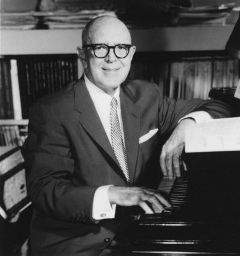
Jimmy McHugh
‘I Can't Give You Anything but Love, Baby’s’’ popularity can easily be determined from the chart information, especially from 1928. But the chart also establishes the tune’s continued popularity. Obviously, Armstrong’s most famous version of the tune was the one done on March 5, 1929 with Luis Russell, but Armstrong originally encountered it on December 11, 1928. It was done during Armstrong’s last great burst of Chicago recordings with Earl “Fatha” Hines, a session featuring the vocals of the painfully dated.
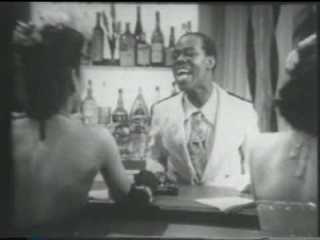
Louis Armstrong sings I Can't Give You Anything but Love, Baby (1942)
Accompanied by Oscar Peterson’s group, saxophonist Lester Young interprets the melody wonderfully at a swinging medium-slow tempo. He also contributes a fabulous solo, as do Peterson and guitarist Barney Kessel. Vaughan’s nickname of “Sassy” is very appropriate on this slyly-swinging performance. Benny Carter’s big band arrangement features some slick ensemble passages with Sarah Vaughan scatting, along with a nice vibraphone solo by Larry Bunker.
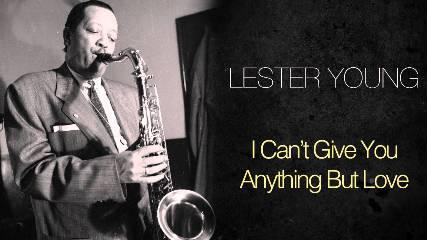
In the 100-most recorded songs from 1890 -1954, “I Can't Give You Anything But Love, Baby” (1928) is No. 24. The song continues to appeal, including new cover versions, and several uses in popular movies and plays since 2000.
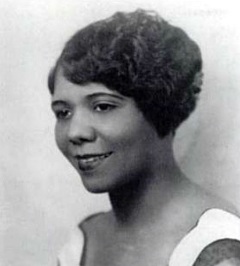
Aida Ward, 1928
NONETHELES:
Although this song is credited to Jimmy McHugh the fact that these parts are in Waller’s handwriting argues strongly that he, not McHugh, was the original composer of the song (see Machlin, “Fats Waller Composes,” Annual Review of Jazz Studies 7, 1994-95). Andy Razaf's biographer Harry Singer discusses a 1929 piece from "The New York Post" about Fats Waller, in which Waller mentions selling a song to a white composer, who put it in a "musical comedy", where it became the major hit, netting royalties of $17,500 for its “composer” who had purchased the tune from Fats for $500. A number of Fats’ colleagues admitted that Fats did make a practice of selling compositions to white songwriters, often for as little as $10.Waller was known to sell songs, and this description would fit "I Can't Give You Anything but Love (Baby)". There is also evidence that McHugh purchased another song from Waller that McHugh copyrighted in 1935.
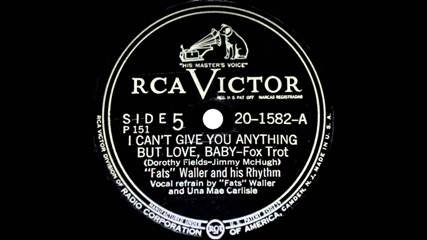
Fats Waller - I Can't Give You Anything but Love, Baby (Single, 1939)
As to the lyrics, Singer reports that Gladys Redman, Don Redman's widow, went to visit Razaf when he was in the hospital in the early 1970s. According to Gladys, she asked Razaf to sing her his favorite of the lyrics that he had written, and he sang in a hushed voice, "I Can't Give You Anything but Love (Baby)".
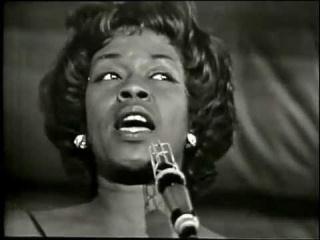
Sarah Vaughan sings I Can't Give You Anything but Love, Baby
Despite the controversy over the tune, no one has come forth over the years to question the authorship of the other Fields/McHugh tunes from the show, which are excellent and occasionally resurface in jazz versions: “Digga Digga Doo,” “I Must Have That Man,” and “Doin’ the New Lowdown.”
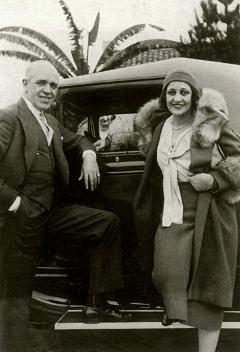
Jimmy McHugh and Dorothy Fields
Finally a comment from Dorothy Fields' son, David Lahm:
" While I think it's pointless trying to identify the best song ever written in this American style we call "standards". I don't believe there's a more beloved song than ‘I Can't Give You Anything But Love.’ I have played this song many times to those in their 80s and 90s and it's as if this song has given validation and confirmation to many memories - or taken the place of memories of when they were young, optimistic and the light of someone's life. It's as if someone understands what it's like to look so far behind themselves in search of what they once were. I think that person who understands is my mother."
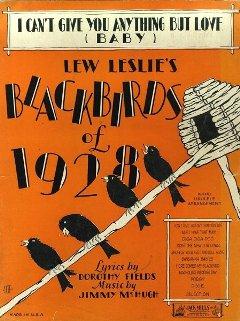
‘Blackbirds of 1928’, poster
I can't give you anything but love (baby)
I can't give you anything but love, baby That's the only thing I've plenty of, baby Dream a while scheme a while We're sure to find Happiness and I guess All those things you've always pined for Gee, I'd like to see you looking swell, baby Diamond bracelets Woolworth doesn't sell, baby Till that lucky day You know darned well, baby I can't give you anything but love
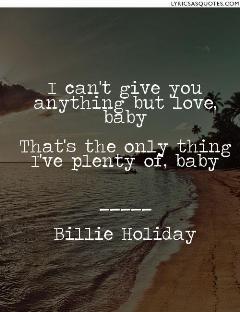
Last Updated (Thursday, 02 November 2017 21:16)
